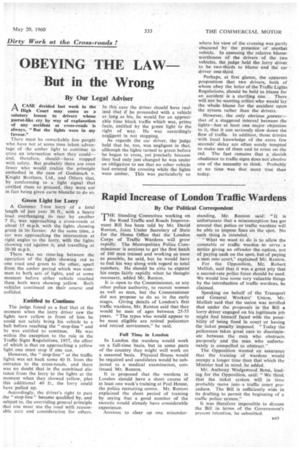Rapid Increase of London Traffic Wardens
Page 77

If you've noticed an error in this article please click here to report it so we can fix it.
By Our Political Correspondent THE Standing Committee working on the Road Traffic and Roads Improvement Bill has been told by Mr. David Renton, Joint Under Secretary of State for the Horne Office that the London Corps of Traffic Wardens will grow rapidly. The Metropolitan Police Commissioner is anxious to get 'the first batch of 100 men trained and working as soon as possible, he said, but he would have to feel his way along with regard to total numbers, He should be able to expand his corps fairly rapidly when he thought necessary, added Mr. Renton.
It is open to the Commissioner, or any other police authority, to recruit women as well as men, but the Commissioner did not propose to do so in the early stages. Giving details of London's first traffic wardens, Mr. Renton said that they would be men of ages between 25-55 years. "The types who would appear to be most eligible are retired policemen and retired servicemen," he said.
Full Time in London
In London the wardens would work on a full-time basis; but in some parts of the country they might well work on a seasonal basis. Physical fitness would be required and candidates would be subjected to a medical examination, continued Mr. Renton.
It is proposed that the wardens in London should have a short course of at least one week's training at Peel House, the police recruiting centre. Mr. Renton explained the short period of training by saying that a good number of the recruits would already have considerable experience.
Anxious to clear up one misunder
standing, Mr. Renton said: "It is unfortunate that a misconception has got around that police or traffic wardens will be able to impose fines on the spot. No such thing is intended.
"What we want to do is to allow the constable or traffic warden to serve a notice giving an offender the option, not of paying cash on the spot, but of paying a sum into court," explained Mr. Renton.
For. the Opposition, Mr. Robert Mellish, said that it was a• great pity that a second-rate police force should be used. We would lose some very valuable things by the introduction of traffic wardens, he claimed.
Speaking on behalf of the Transport and General Workers' Union, Mr. Mellish said that the union was terrified that under the proposals in the Bill a lorry driver engaged on his legitimate job might find himself faced with the possibility of being fined in court or having the ticket penalty imposed. "Today the policeman takes great care to discriminate between the man who obstructs purposely and the man who unfortunately is compelled to obstruct."
The Opposition wanted an assurance that the training of wardens would occupy a longer time than that which the Minister had in mind, he added.
Mr. Anthony Wedgewood Benn, leading for the Opposition, said: "We think that the ticket system will in time probably move intoa traffic court procedure. The Bill is sufficiently wide in its drafting to permit the beginning of a traffic police • system."
It was therefore impossible to discuss the Bill in terms of the Government's present intention, he submitted.




















































































































